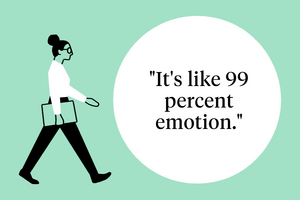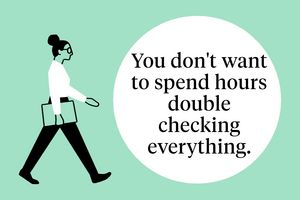Careers Jan 3, 2023
3 Tips for Reinventing Your Career After a Layoff
It’s crucial to reassess what you want to be doing instead of jumping at the first opportunity.

Lisa Röper
Layoffs frequently take people by surprise. Even top performers may find themselves out of a job due to sweeping change in an industry, belt-tightening at a company, or a shift in corporate priorities.
So what should you do once the initial shock of being let go wears off? Jump immediately into searching for your next role?
“For many people, their initial instinct results in a flurry of activity,” says Ellen Taaffe, clinical assistant professor of management and organizations, and director of women’s leadership programs at the Kellogg School.
But this frenzy can be counterproductive, robbing you of the chance to evaluate what you really want next in your career—and the steps to help you get there. Even the timeworn advice to treat a job search like a full-time job can backfire, Taaffe cautions, because it can create undue pressure to jump at the first opportunity, regardless of fit.
Taaffe lays out three steps to moving beyond a layoff and preparing yourself for the next step in your career.
1. Pause to gain perspective
In the immediate aftermath of a layoff, emotions generally run high. You might feel some combination of disbelief, anger, betrayal, and embarrassment, even if you are part of a larger wave of layoffs.
It’s important to acknowledge a layoff as a major life event, Taaffe says. Giving in to the urge to push past it can mean that you don’t learn much from the experience.
“Taking time to reflect, exercise, spend time in nature, or revisit hobbies can help you gain perspective and regain equilibrium,” Taaffe says. “Even going away for the weekend to be around people that know and care about you can help ground you and give you some breathing room.”
Of course, not everyone is in the financial position to get by for too long without income.
But there is often more time to pause than you may recognize at first. Taaffe recommends building time for rest and reflection into your job search as your financial situation allows.
“Talking to other people who have experienced a layoff can help you to avoid catastrophizing,” Taaffe adds. “Over time, you will see that the experience will be only a blip on your resume, even if it is painful in real time. It may open up whole new opportunities and lead to something you always wanted to do.”
2. Recalibrate your priorities
Your next job search should begin with a review. Take stock of what you liked most about your previous position and consider what matters most to you now. Taaffe recommends creating a top-10 list of your priorities for your next job. For example, you might be most interested in a particular kind of work, or you might value a shorter commute or a chance to develop a new skill set.
This list will give you a way to evaluate potential new jobs, comparing their features with the priorities on your list. This exercise reminds you that you have some control over the process and that no job is perfect, but some are more suited to your priorities than others.
“No job is going to be a 100 percent fit—and most won’t rate more than 80 percent to 90 percent—but by using this exercise, you might recognize that some aspect of the job is an absolute dealbreaker,” Taaffe says.
“Over time, you will see that the experience will be only a blip on your resume, even if it is painful in real time.”
—
Ellen Taaffe
After Taaffe’s brand-management position at Whirlpool was eliminated during the financial crisis of 2008–09, she was evaluating similar jobs in other industries when she realized she was tired of presenting slide decks and sitting in meetings all day.
“What I wanted to do was work with good, smart people to advance brands and consumer insights,” she says. “I always wanted to try something more entrepreneurial.”
After spending 25 years in corporate America, she joined a boutique market-research and brand-strategy firm, where she got to lead a small business with an amazing culture, diversify the portfolio of products and services, and do more of the coaching and business-building work she loved.
But understanding how well particular opportunities match your priorities takes some time and effort. Taking on a consulting project is a helpful way to learn how team members interact and get things done. Taaffe led a strategy engagement session before making the leap to her new firm as it enabled her to believe the fit would be an ideal next step.
Without access to the inner workings of the company, it may be difficult to see beyond job titles and compensation to weigh your interest in the structure of the work, company culture, and growth opportunities. During interviews, Taaffe recommends asking current employees how they would describe the culture and what types of people succeed in the organization—as well as what happens when things go wrong.
“Some companies believe that if they’re not failing at something every year, they’re not being innovative enough,” she says. “For other companies, if that product launch failed, everyone on that team is gone. It’s about understanding how they handle risk. Most importantly, ask yourself: Does it represent a culture where you can learn and thrive?”
3. Lean into your network
One potentially uncomfortable aspect of reentering the job market is activating the network that you have cultivated over your career. While Taaffe advises her students to remain connected with their network consistently—so that they are not reaching out only when they need something—it is not always easy to muster the effort and occasion to do so.
“After you have gone through a layoff, you tend to not let your network go dormant again,” Taaffe says. “But the first time it happens, it may take effort to reactivate those relationships.”
Taaffe has a few simple rules for contacting people you may not have talked to for a long time: acknowledge the gap and explain that you’d like to reconnect, then share that you’ve been laid off and that you would like to hear how their story and career moves might be helpful in figuring out your next steps.
Some who have been laid off find it easier to skip the one-on-one and seek advice more publicly. One of Taaffe’s former students recently shared the news of her job loss in a LinkedIn post and asked her network for help.
Some may find that lingering shame, though unfounded, makes them hesitant to reach out. You have to continually remind yourself that a layoff is part of many if not most careers and is not personal. If you’re feeling isolated, Taaffe says, start by talking with those you trust most about how to talk about your situation and expand your circle.
When networking, however, Taaffe recommends that you always start with a specific request for those to whom you are reaching out.
“Avoid the dreaded question, ‘Can I pick your brain?’” Taaffe says. “This signals that you haven’t taken the time to focus your thoughts. You need to make it easy for busy people to know how to help you.”
You will have more success asking someone in your network for a 30-minute meeting to hear about their transition from sales to marketing—and how you can learn from it—than to use meetings to rehash where things went wrong at your last job.
“What happened in the past should be about 10 percent of the conversation,” Taaffe says, “while 90 percent should be about what’s next, what you’re looking to learn, and how you’d like to make an impact.”
Amy Merrick is a writer based in Chicago.



